Confusion reigns all around us at the moment. My recent journeys to and fro to London as back up baby minder along with brisk forays to a Kent hospital to visit another relative have left me uncertain from time to time as to where I am or what day it is. I’m not the only one as quite few failed to note that the Harvest Festival at Ipsden started at 6pm this year, rather than 6.30 as it had been for some years past (a previous incumbent was very firm that church services should always start on the half hour!). However, being the vicar’s entourage ( if you can have an entourage of 1), I was fortunate enough to have been on time (well, incredibly early actually, so the urn was almost excited to boiling point before the service had even begun).
Consequently the service started with noticeably fewer people than harvest festivals usually attract but after a while, and at irregular intervals the church door creaked unofficial announcements of new arrivals as people attempted the impossible task of slipping in. We towards the front initially fought the urging of niggled curiosity to turn round – but the sheer number of creakings rendered this hopeless, and with nosiness overcoming will power we turned round for a good look at exactly who the latecomers were.
So it was that thoughts of bounteous harvests and glorious fruitfulness became interrupted by musings that there can be little more English than the noise of an ancient church door turning on rusted hinges and summoning up the atmosphere of centuries past in those long drawn out metallic wheezings. In Human Voices, Penelope Fitzgerald calls upon the church hinge to carry an even greater metaphorical weight as it becomes the exemplification our country’s heritage. In this short but complex and demanding novel she suggests that at the time of the Munich Agreement a memo was sent round the BBC “calling as a matter of urgency, for the recording of our country’s heritage.” (I have no idea whether this is true or not.) I hope you enjoy the following passage as much as I do – and might even laugh out loud!
“It (the memo) was headed Lest We Forget Our Englishry. Sam had disappeared for over two weeks in one of the Wolseleys, pretty infirm at that time, with an engineer and an elderly German refugee, Dr Vogel – Dr Vogel, cruelly bent, deaf in one ear, but known to be the greatest expert in Europe on recorded atmosphere.”
…
The expedition to the English countryside arrived back with a very large number of discs. The engineer who had gone with them said nothing. He went straight away to have a drink. It was probably a misfortune that the Controllers were so interested in the project that they demanded a playback straight away. Usually there was a judicious interval before they expressed any opinion, but not this time.
‘What we have been listening to – patiently, always in the hope of something else coming up – amounts to more than six hundred bands of creaking. To be accurate, some are a mixture of squeaking and creaking.’
‘They’re all from the parish church of Hither Lickington,’ Sam explained eagerly. ‘It was recommended to us by Religious Broadcasting as the top place in the Home Counties. What you’re hearing is the hinges of the door and the door itself opening and shutting as the old women come in one by one with the stuff for the Harvest Festival. The quality’s superb, particularly on the last fifty-three bands or so. Some of them have got more to carry, so the door has to open wider. That’s when you get the squeak.’
‘Hark, the vegetable marrow comes! cried Dr Vogel, his head on one side, well contented.”
Wonderful!
Richard Eder in a review of the book in the New York Times (5.5.99) suggests “Penelope Fitzgerald’s novels are all about the subordinate clauses. A leading action, a statement, a mood are yanked from below like a fishing float and dart and zigzag away”.
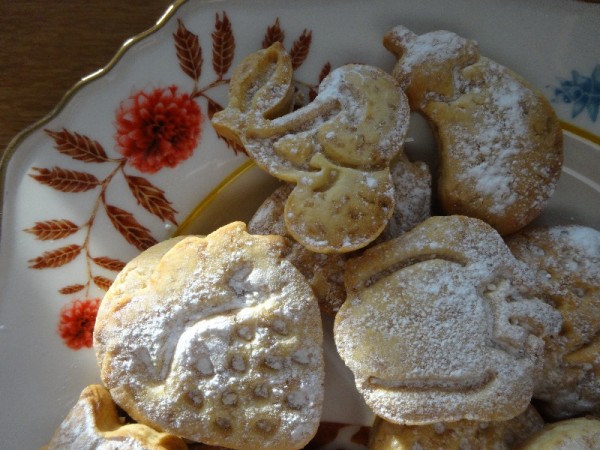
Vanilla Biscuits Vanilla biscuits from Biscuiteers Book of Iced Biscuits by Harriet Hastings and Sarah Moore (2010 Kyle Cathie Ltd.)
As well as the biscuits (recipe below) I also baked a sort of upside down pear cake. The recipe called for sunflower oil and I had none, so substituted walnut oil. As a corner had fallen off the cooked cake, I sampled it – and what a good job I had for it was disgusting. The sponge was lovely and the pear was delicious but pervading the whole thing was the taste of what I must assume was rancid oil. We scraped the pear off the top and threw the rest away. What a waste. The vicar has since bought a bottle of sunflower oil and I shall try the recipe again.
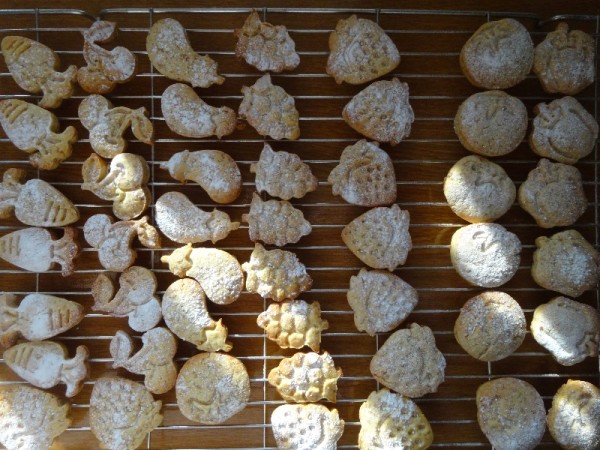
Vanilla Biscuits
(Biscuiteers Book of Iced Biscuits by Harriet Hastings and Sarah Moore; 2010 Kyle Cathie Ltd.)
We had had to abandon supper at the vicarage after the Harvest Festival as I had been so little at home recently. 7.30pm seemed a bit late for coffee after the service but I took it anyway. Then someone appeared saying she’d got a couple of bottles of wine in her car boot and it was loaves and fishes (on a small scale) all over again. Most were driving so tiny amounts were just right. (Three bottles would have been perfect) and these biscuits were great with the white wine. I picked up the below biscuit book reduced in a National Trust shop and have to report it’s a better book than I expected. Tips to roll the dough out between baking parchment/grease proof paper and to use the handle of wooden spoons, etc to rest the rolling pin on to get even height biscuits were really helpful (though you out there have probably all been doing this for ever…) My small nod in the direction of harvest lay in using these fruit and vegetable cutters.
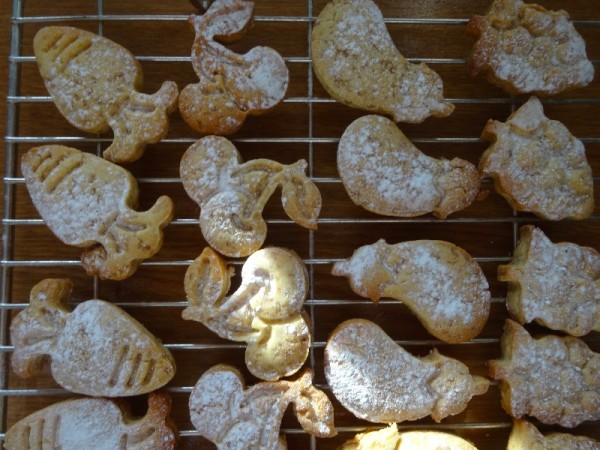
Vanilla biscuits from Biscuiteers Book of Iced Biscuits by Harriet Hastings and Sarah Moore (2010 Kyle Cathie Ltd.)
Vanilla Biscuits
(Biscuiteers Book of Iced Biscuits by Harriet Hastings and Sarah Moore; 2010 Kyle Cathie Ltd.)
Ingredients (for 48 smallish biscuits)
1/2 a vanilla pod or 1/2 teasp natural vanilla essence
350 g plain flour
100 g self raising flour
125 g granulated sugar
125 g salted butter, diced
125 g golden syrup (warmed by ….)
1 large egg lightly beaten
(I had only demerara sugar & unsalted butter)
If using the vanilla pod sliced down the pod with a sharp knife so it splits in two and then scrape the seeds out of one of the halves with a teaspoon and into the sugar. (If using the essence, add it to the beaten egg.)
Stir the flours together, add the sugar and mix well.
Using the tips of your fingers rub the butter into the dry ingredients until fine breadcrumb stage.
Make a well in the centre and add syrup and egg and mix until it begins to come together. Now divide it into two and flatten these discs, cover with cling film and chill for at least half an hour.
Excellent advice about rolling the dough suggests rolling it between 2 sheets of greaseproof paper so no extra flour is needed which makes the dough harder and less moist. More good advice is that when you’ve decided how thick you want your biscuits, choose a couple of for e,g, wooden spoons and rest the rolling pin on these as you roll. (If the greased proof paper wrinkles, just pull it off, smooth it down and roll again.) (You could chill it again at this stage but it’s not necessary.)
Trimmings can be re-rolled a couple of times – as no extra flour needed.
Heat oven 180 º C/ 160 º C fan oven/350 º F/Gas mark 4
Cook for about 10 minutes for small biscuits, longer if you are only making 24 of the larger size (14-18 mins)
When just turning golden remove from oven and place sheet of baking parchment or individual biscuits on to a cooling rack.
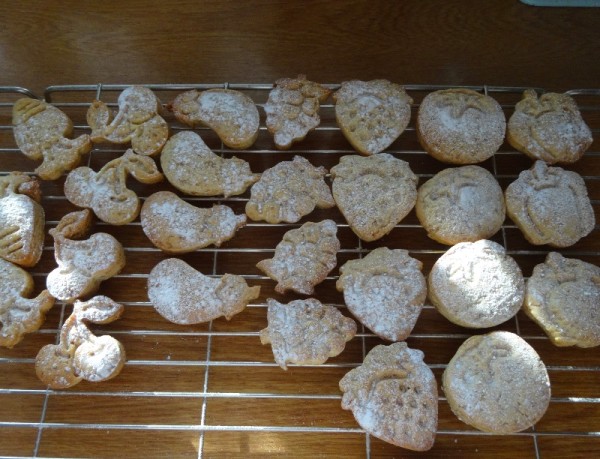
Vanilla Biscuits
(Biscuiteers Book of Iced Biscuits by Harriet Hastings and Sarah Moore; 2010 Kyle Cathie Ltd.)
One final addition to this rambling post concerns interesting information gleaned (oops, accidental harvest allusion) from a Matt Ridley article in The Times of 21 September 2015. (Matt Ridley is now Viscount Ridley, and a farmer, zoologist, journalist and author of several popular science books, though you may remember him as the Chairman of Northern Rock when it failed). With his farming hat on, he says the yield on his fields would be beyond our ancestors’ dreams. An English farmer in the 1300s would be fortunate if for every grain he planted he got 4 back (one of these would be held over for next year’s seed and some of the remainder would also have to go to his master or tribal chief). Today fields yield 60 or 70 grains for every one planted.
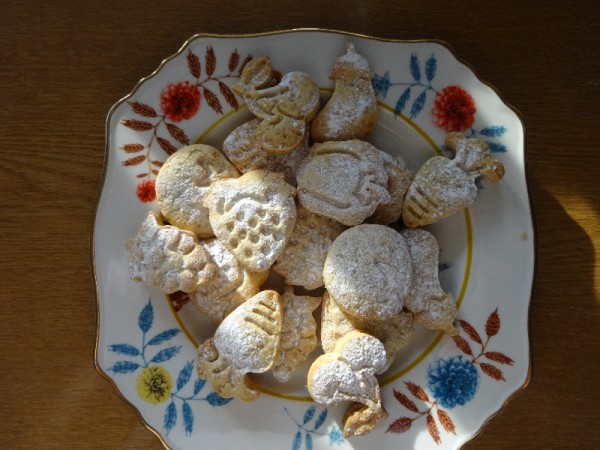
Vanilla Biscuits
(Biscuiteers Book of Iced Biscuits by Harriet Hastings and Sarah Moore; 2010 Kyle Cathie Ltd.)
We have been trying to figure out what birds are spending the early evening lined up on the electric cables slung between posts in the field behind us. Too big for sparrows, too few for starlings (and nothing like enough for a murmuration), and too small for any of the Corvidae, could they be Scandinavian blackbirds coming here for winter? Possibly as Derwent May’s Nature Notes in today’s Times tells me that “they quickly disperse themselves practically invisibly among our native blackbirds. (although) they can sometimes be picked out by their nervous manner and tendency to stay in flocks.”

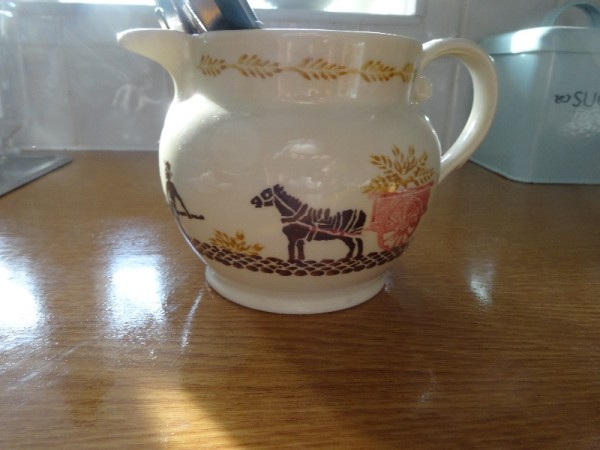
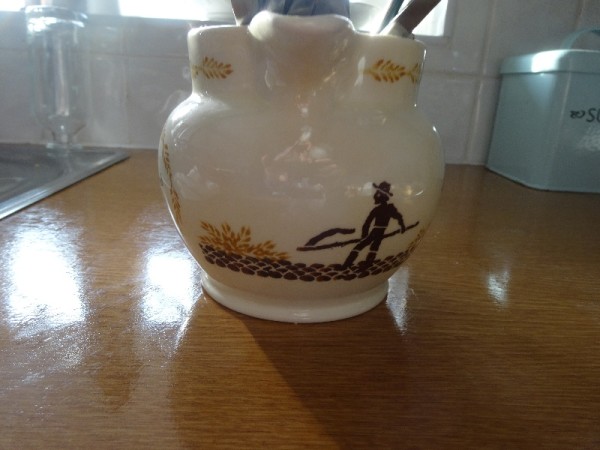
10 Comments
The fruit and vegetable cutters do add to the charm of the plate, don’t they.
I had a good chuckle at that extract from “Human Voices” – thank you!
The cutters – bought in a rash moment when a reduced sticker enticed me – worked out rather better than I expected.
I can now never hear a hinge creak but this passage comes into my head.
Fun post, thank you. I’ll admit that I laughed out loud a few times. I’m about to start a pumpkin pound cake for a fall dinner at my church. Thankful for abundance and the joy of being together.
Love pumpkin pie, maybe I should have a go at a pumpkin cake. Hope your dinner goes well.
Oh dear – numerous sins to confess today.
1. Coveting of jug
2. Coveting of plate
3. Coveting of biscuit cutters.
I’m probably beyond redemption.
I am sure that Penelope Fitzgerald was taking a sly dig at Nikolaus Pevsner who had just completed his extraordinary magnum opus when she was writing ‘Human Voices’.
It is funny how pottery excites some of us, isn’t it?
Jug and cutters came in sales while the plate is Anthropologie (made in China though designed in England).
This plate – which incidentally has a giraffe beneath the biscuits – fascinates me – why the different coloured flowers and leaves – if I’d designed it there’d be more balance of colour and symmetry but I rather admire that someone decided not to do this!
I hadn’t thought about Pevsner whose books certainly merit digs for their dryness and almost complete unemotional involvement – even if that’s exactly what he was aiming for.
What Penelope Fitzgerald would make of the BBC today is quite something else to muse on.
Hello Mary – It seems you are having a very busy time at the moment but an enjoyable one too.
I have not read the books you mention but living Over Here the sounds of Englishry would be rather wonderful for me and perhaps they could also include the smells and scents of Englishry too…. Even after 34 years hardly a day goes by that I do not think of Over There…. Ah, well.
The biscuits look yummy and I bet everyone enjoyed their After Harvest get together.
I can’t begin to think what the pre-eminent smells and scents of Englishry would be – apart from the inside of ancient churches with their mix of a bit of damp, dead flowers and the occasional hint of incense. Old libraries too perhaps with that strange sweetness old books give off. What else? Honeysuckle, roses, grass after rain … and now I’m stumped. What are the smells you remember, Lydia? Because I’ve never lived anywhere else, I take what I know for granted.
It is, however, still true that you go 22 short miles from Dover to Calais and France smells very different from England.
What a varied post, it seems to sum up your very hectic life at the moment! I laughed at your being an ‘entourage of one’. I have in my baking armoury two longish, plastic, rectangular rods, which I always use when rolling out biscuits dough, giving me biscuits of even thickness. I can’t remember where I bought them, but they were not expensive, and have been incredibly useful. I imagine lengths of dowelling (frisked for splinters, perhaps sanded down at the ends?) would do the same job very well. X
Rectangular rods sound better than wooden spoons – such a simple idea to lean the rolling pin on something. Your biscuits always look perfect, Penny.
One Trackback
[…] For anyone wanting to be reminded the slight chaos of village church Harvest festivals do read my blogpost http://www.addisonembroideryatthevicarage.co.uk/2015/10/09/harvest-festival-2015/ […]